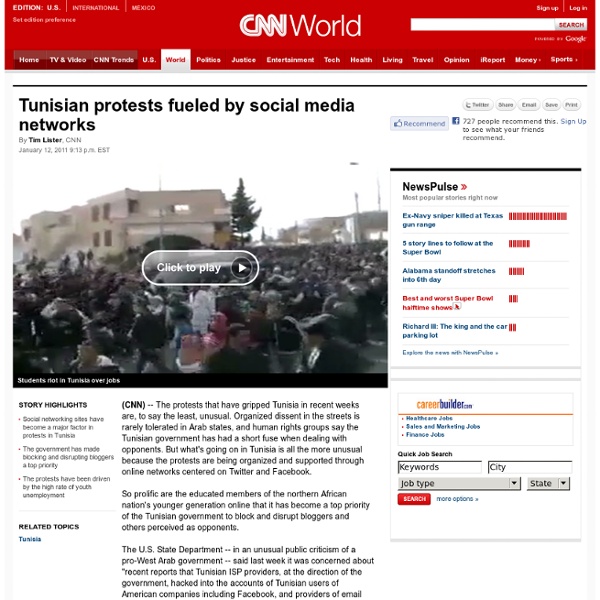The First Twitter Revolution? - By Ethan Zuckerman
Friday evening, Tunisian President Zine el-Abidine Ben Ali boarded a jet for Malta, leaving his prime minister to face streets filled with protesters demanding a change of government in the North African country. The protests began weeks earlier in the central city of Sidi Bouzid, sparked by the suicide of Mohamed Bouazizi, an unemployed university graduate whose informal vegetable stall was shuttered by the police. His despair exemplified the frustration that many Tunisians felt with their contracting economy, high levels of unemployment and inequality, censored media and Internet, and widespread corruption. Protests spread from city to city, with trade unions, lawyers, and countless unemployed Tunisian youth demanding a change to an economic system that appeared to benefit a small number of families close to power and leave ordinary citizens behind. As the protests intensified, Ben Ali offered concessions to his people: 23 years into his reign, he agreed to step down in 2014.
Tweeting Tyrants Out of Tunisia: Global Internet at Its Best | Threat Level
Even yesterday, it would have been too much to say that blogger, tweeters, Facebook users, Anonymous and Wikileaks had “brought down” the Tunisian government, but with today’s news that the country’s president Zine El Abidine Ben Ali has fled the country, it becomes a more plausible claim to make. Of course there was more to such demonstrations than some new technology. An individual act of desperation set off the last month of rioting, as a college-educated young man set himself on fire after police confiscated his unlicensed fruit and vegetable cart. Tunisia’s high unemployment rate, rampant corruption and rising food prices added to the anger at Ben Ali’s 20-plus-year rule. People risked their lives in the street, with some getting a bullet for their troubles, but the internet played a significant role in organizing these protests and in disseminating news and pictures of them to the world. Here’s a guide to the part of this battle fought in cyberspace over the last month.
Revolution 2.0: Rebooting Tunisia
A Twitter Snapshot Of The Tunisian Revolution: Over 196K Mentions Of Tunisia, Reaching Over 26M Users
After four weeks of civil unrest, the fall of the Tunisian president Ben Ali played out for all the world on Twitter this Friday, some dubbing it a “Twitter Revolution” like the election protests in Iran and Moldovia. Increasingly, collective events from TV shows to the World Cup to #lessambitiousmovies to the fall of dictatorships cause spikes in related conversation on the microblogging network which, with its broad media influencer adoption, has become the world’s eminent news amplifier. Christopher Golda of Backtype (which does Twitter analysis) provided us with snapshot of Tunisa mentions on Friday January 14th. All in all tweets mentioning Tunisia showed up in Twitter streams as many as 329 million times, reaching 26 million Twitter users. According to Backtype, the top ten Tunisian related tweets were:
Tunisie: petite histoire illustre dAmmar Article OWNI, Digital Journalism
Ammar était le petit nom donné par les Tunisiens à la cyber-censure dure organisée par le régime Ben Ali. Voici ce qu'ont subi les internautes tunisiens dissidents sous le règne d'Ammar. Hommage aux Tunisiens qui ont inventé le cyber-activisme. Mise à Jour : c’est évidemment avec un immense plaisir que nous annonçons la nomination aujourd’hui 17 janvier 2010 de Slim Amamou, dont il est question dans cet article, au poste de Secrétaire d’état à la jeunesse et aux sports dans le gouvernement provisoire tunisien. La censure de type “industriel” d’Internet qu’a pratiqué le ministère tunisien de l’Intérieur pendant dix ans, et que l’on découvre aujourd’hui, n’avait rien à envier à la censure chinoise ou iranienne. La 404 bâchée Ammar n’existe pas, mais Ammar travaille bien pour le ministère de l’Intérieur, ou bien l’ATI (Agence Tunisienne de l’Internet). Une "404 bâchée" - illustration du groupe tunisien "Error 404" sur Facebook Bannière d'une campagne tunisienne contre la cyber-censure
Cyberwar in Tunisia
Thousands of Tunisians have taken to the streets in recent weeks to call for extensive economic and social change in their country. Among the fundamental changes the protesters have been demanding is an end to the government's repressive online censorship regime and freedom of expression. That battle is taking place not just on the country's streets, but in internet forums, blogs, Facebook pages and Twitter feeds. The Tunisian authorities have allegedly carried out targeted "phishing" operations: stealing users passwords to spy on them and eradicate online criticism. Anonymous, the loosely-knit group of international web activists that drew world attention for their "distributed denial of service" (DDoS) attacks on the servers of companies that blocked payments and server access to the whistle-blowing website, WikiLeaks, joined the fray, in solidarity with the Tunisian uprising. Killing dissent The first attempted hijacking of his Facebook account happened last week. 'Phishing' for dissent
First Wikileaks Revolution: Tunisia descends into anarchy as president flees
By Daily Mail Reporter Updated: 17:27 GMT, 15 January 2011 President Ben Ali goes into exile in Saudi Arabia after 23 years in powerBut his departure does not calm riots as anarchy breaks outPower changes hands for second time in 24 hours as Constitutional Court declares president has left office 'for good'Published US Embassy cables likened President's family to a Mafia elite Department of State issues travel alert to avoid the north African country Events in Tunisia have led to it being called the 'First Wikileaks Revolution'. Although there has long been opposition to the corrupt rule of President Ben Ali, protests gathered pace when US embassy cables were published by Wikileaks. Zine El Abidine Ben Ali fled the North African state he ruled for 23 years yesterday. He has gone into exile in Saudi Arabia. But his departure has not calmed the violence as anarchy broke out on the streets of Tunis today. Yesterday Prime Minister Mohammed Ghannouchi took charge as the interim leader. Enlarge



